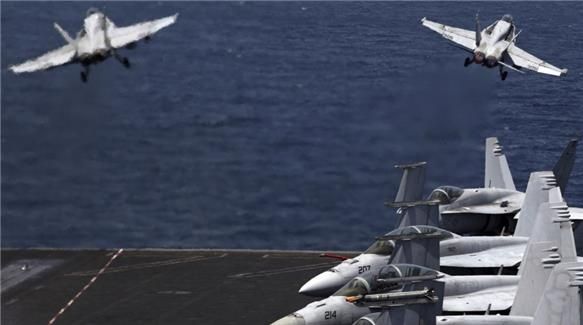
Dozens of people are reported to have been killed in air strikes targeting the Islamic State of Iraq and the Levant (ISIL) in Hawijah in Iraq, reports say.
Sources told Al Jazeera that civilians were among at least 70 people killed in the air strikes on a warehouse controlled by ISIL.
Al Jazeera's Imran Khan, reporting from Baghdad, said the attacks in Hawijah, in the Kirkuk governorate, occurred during the early hours of Wednesday but it was unclear who carried them out.
Separately, the US military said coalition forces conducted 18 air strikes targeting ISIL in 10 Iraqi cities since Tuesday morning, as well as four air strikes against the group in Syria.
The attacks in Iraq destroyed ISIL targets including buildings, fighting positions, tactical units, vehicles and heavy machine guns, the Combined Joint Task Force said in its statement on Wednesday.
Cities hit included Ramadi [recently captured by ISIL], Sinjar, Tal Afar, Baiji, Kirkuk, Mosul and Fallujah, it said.
The statement said the air strikes in Syria destroyed six ISIL fighting positions near Hasakah and an armoured vehicle near Deir Az Zor, where they also hit a tactical unit.
Against this backdrop, the US said at least 10,000 ISIL fighters had been killed since the international coalition started its campaign against them nine months ago in Iraq and Syria.
"We have seen a lot of losses within Daesh since the start of this campaign, more than 10,000," Antony Blinken, US deputy secretary of state, said on France Inter radio, using the Arabic acronym for ISIL.
He said there had been a great deal of progress in the fight against ISIL but that the group remained resilient and capable of taking the initiative.
"At the start of this campaign [we] said it would take time," Blinken said. "We have conceived a three-year plan and we're nine months into it."
'Regional problem'
Blinken's comments came as US President Barack Obama's envoy charged with building the coalition against ISIL said in Doha that the growth of the group had global implications and, if unchecked, its fighters could "wreak havoc on the progress of humanity".
Retired General John Allen said on Wednesday in the Qatari capital that ISIL was not merely an Iraqi problem or a Syrian problem but "a regional problem trending towards global implications".
Allen said it was critical that all anti-ISIL forces in Iraq fell under Iraqi government authority and that the task of countering the flow of foreign fighters into the region could not rest with Turkey alone.
Separately, Reuters news agency reported quoting local officials that ISIL had closed the gates of a dam on the Euphrates River in western Iraq, reducing the water and giving them greater freedom of movement to attack government forces downstream on the southern bank.
The fighters have redirected the flow of water to their advantage on the battlefield around the city of Ramadi, the officials said.
But, they said, the tactic also threatens southern provinces with drought and the water has been reduced to worrying levels.
The Euphrates has acted as a barrier between the fighters who control its northern bank and pro-government forces who are are trying to advance towards Ramadi on the other side.
A spokesman for the governor of Anbar province, of which Ramadi is the capital, said security forces would now have to redeploy along the river to prevent the fighters from infiltrating.
Hikmat Suleiman said: "Previously they had to monitor only the bridges and certain areas, but now all of the river will be crossable."
Last summer, the fighters seized the Mosul dam in northern Iraq and threatened to submerge Baghdad until Kurdish forces drove them back with the help of air strikes from an international coalition.
Source: al-jazeera
 В Атырау -10
В Атырау -10